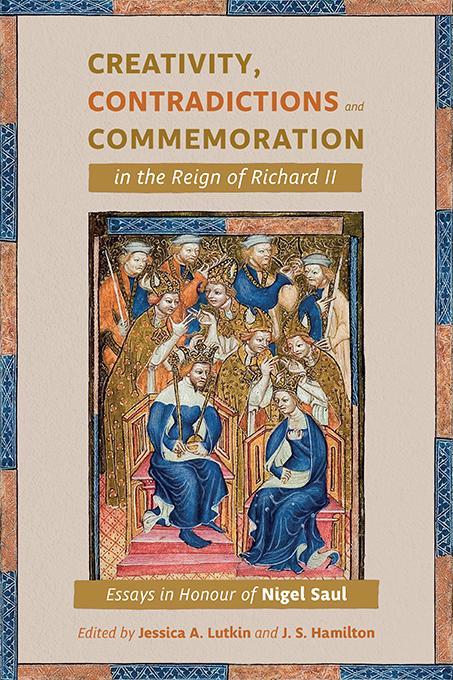 Creativity, Contradictions and Commemoration in the Reign of Richard II
Creativity, Contradictions and Commemoration in the Reign of Richard II Introduction
Published online by Cambridge University Press: 26 May 2022
Summary
This collection of essays is a tribute to the tremendous impact that Nigel Saul has had over a long and brilliant career, as a scholar, mentor, and friend. Contributors include a broad array of his colleagues from both sides of the Atlantic as well as a number of his doctoral students who continue to carry on aspects of his work in their own. These essays begin, quite fittingly, with a contribution from Caroline Barron, Nigel Saul's long-time colleague at Royal Holloway and Bedford New College, University of London, and fellow historian of the reign of Richard II. She presents the first of three studies of literary sources for the reign of Richard II. Taking her lead from a suggestion in Nigel's biography of Richard II, she reconsiders the reliability and value of Froissart's account of the Peasants’ Revolt of 1381 in London through an examination of his likely sources of information. A detailed comparison of the individuals reported to be at the Tower of London on Wednesday, 12 June and at Mile End on Friday, 14 June by the author of the Anonimalle Chronicle on the one hand, and Froissart on the other, proves quite revealing. Barron identifies one primary stream of information that is absent from the Anonimalle Chronicle. This is a group of four Flemish nobles: Robert of Namur, lord of Beaufort; John Janche, lord of Gommegnies; Eustace de Bousies, lord of Vertaing; and Sir Henry of Senzeille. Robert of Namur was, in fact, Froissart's earliest patron and a (generally) loyal subject and pensioner of the English Crown. He was certainly in England in the summer of 1381, but then returned to Flanders later in the year to assist Louis de Mâle at the siege of Ghent, raising the possibility that he shared fresh memories of the English revolt with the chronicler. Similarly, the other Flemings can be connected to both Robert of Namur and Froissart directly or indirectly, and this adds weight to his account of these crucial events in London in June 1381. Froissart's emphasis on the role of William Montagu, earl of Salisbury, is also stressed as likely the result of an eyewitness account. Barron argues strongly for a reconsideration of those unique elements of Froissart's account that may well be the result of first-hand accounts of the events.
- Type
- Chapter
- Information
- Creativity, Contradictions and Commemoration in the Reign of Richard IIEssays in Honour of Nigel Saul, pp. 1 - 8Publisher: Boydell & BrewerPrint publication year: 2022


